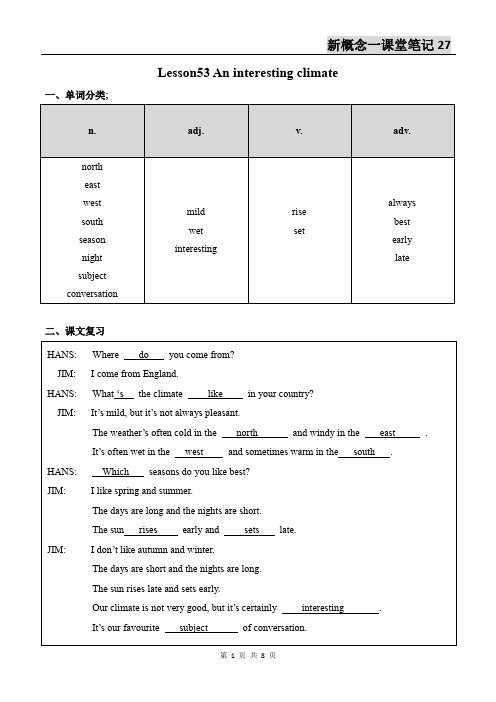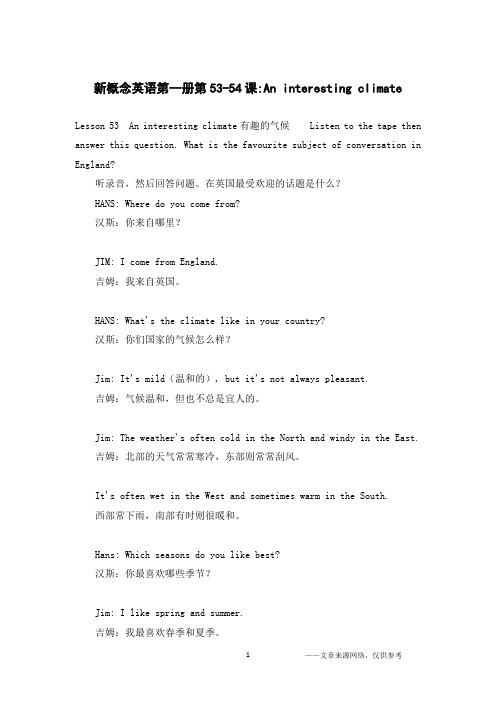新概念英语第一册53课笔记
新概念英语第一册Lesson53-54笔记(语法点+配套练习+答案)

老师正在和Alin谈话。
The teacher is having a conversation with lin.
四、词组
come from
来自...
in the east
在东部
What’s the climate like?
气候怎么样?
in the south
1.What nationality are you?(同义句)
Wheredo youcomefrom?
2.Whichseasons do you likebest?(根据答语写出问题)
I like spring best.
3. I come fromFrance.(对划线部分提问)
Wheredoyou come fron?
Japanese
Nigerian
Turkish
Korean
Polish
Thai
练习:
1.I’m Australian. I come fromAustralia.
2.He’sAustrian. He comes from Austria.
3.He’s Canadian. He comes from.
Lesson53 An interesting climate
1、单词分类;
n.
adj.
v.
adv.
north
east
west
south
season
night
subject
conversation
mild
wet
interesting
rise
set
always
新概念英语第一册讲义+Lesson+53++An+interesting+climate+有趣的气候

Lesson 53 An interesting climate 有趣的气候授课内容:一.句型Which season do you like best?The sun rises early and sets late.It’s often wet in the West .二.语言点1. mildadj. (1)(天气等)温暖的;暖和的:They had an exceptionally mild winter last year. 他们那儿去年冬天出奇地暖和。
The climate in the South is always mild and pleasant. 南方的气候总是温和宜人。
(2)(性情等)温和的:John is a mild man who never raises his voice.约翰是一个温和的人,他从不抬高嗓门说话。
I like his gentle and mild voice. 我喜欢他那温和而轻柔的声音。
(3)(食物等)味淡的:Try this mild curry. 试试这种淡味咖喱。
He likes to smoke mild cigars. 他喜欢抽淡味雪茄烟。
2.rise v.(1)(日、月等)升起;上升:The sun rises in the east. 太阳从东方升起。
The curtain rises at 8.00 p. m. 剧在晚上8点钟开演。
(2)(河水、物价、温度等)上涨;升高;增加:The level of the river is still rising. 河水水位仍在上涨。
(3)起身;起床:My mother always rises early. 我母亲总是很早起床。
The house rose to the singers. 全场起立向歌唱演员们致意。
3. in the North = in the north of EnglandNorth 的第一个字母大写, 是因为它单独使用,特指英国的北部.south 南north 北east 东west 西southwest 西南southeast 东南northwest 西北northeast 东北4.Which seasons do you like best?=Which is your favourite season?favourite=like best最喜欢best adv. 最adj. 最好地good /well 好→better 较好→best 最好5. early adv.早←→late.The early bird catches the worm.早起鸟儿有虫吃。
新概念英语第一册第53-54课-An interesting climate

新概念英语第一册第53-54课:An interesting climateLesson 53 An interesting climate有趣的气候Listen to the tape then answer this question. What is the favourite subject of conversation in England?听录音,然后回答问题。
在英国最受欢迎的话题是什么?HANS: Where do you come from?汉斯:你来自哪里?JIM: I come from England.吉姆:我来自英国。
HANS: What's the climate like in your country?汉斯:你们国家的气候怎么样?Jim: It's mild(温和的), but it's not always pleasant.吉姆:气候温和,但也不总是宜人的。
Jim: The weather's often cold in the North and windy in the East.吉姆:北部的天气常常寒冷,东部则常常刮风。
It's often wet in the West and sometimes warm in the South.西部常下雨,南部有时则很暖和。
Hans: Which seasons do you like best?汉斯:你最喜欢哪些季节?Jim: I like spring and summer.吉姆:我最喜欢春季和夏季。
The days are long and the nights are short. The sun rises early and sets late.因为此时白天长而夜晚短,太阳升得早而落得迟。
I don't like autumn and winter. The days are short and the nights are long. The sun rises late and sets early.我不喜欢秋天和冬天,白天短而夜晚长,太阳升的迟而落得早。
新概念英语第一册 Lesson 53 笔记

2012年7月19日Lesson53An interesting climate授课老师:Rebecca笔记整理:宅家三年不出门d adj.温和的,温暖的,(形容词作定语,表语,)昆明has a mild climate.昆明有一个温暖的天气。
(修饰天气,表示温暖的)She's mild.她的性格很温和。
(修饰人,表示性格温和)This dish tastes mild.这道菜尝起来清单。
(修饰菜肴,表示清淡的,dish菜肴)She is playing pp.他正在打乒乓。
(主谓宾,谓语动词is playing)当be动词作在一个句子中作主动词的时候,表示主系表,there be句型除外。
2.Wet adj.潮湿的,Why are you wet?你为什么湿了?Why is your body wet?为什么你身体湿了?You are all wet.你全身都湿透了。
Because it is raining outside.因为外面在下雨。
作及物动词vt.:Wet.Sth.把...弄湿,打湿Wet the window before cleaning it./Wet the window before you clean it.擦窗子之前先把它打湿。
(介词before后面的动词一定要ing,before除了可以作介词,还可以作连词,作连词后面要跟一个句子,做连词后面的句子,需要补充一个主语。
例如:Because I am girl.)Before4o'clock.介词后面跟名词。
Because表因果的连词,before表时间的连词,后面要跟句子,句子得有一个完整的结构。
He wetted his pants.他尿裤子了。
He wetted himself.他把自己打湿了。
Wet one's bed尿床3.Interesting adj.有趣的,Sting n.蜜蜂的那种刺,v.刺伤This is an interesting book.这是一本有趣的书。
新概念课堂笔记第一册Lesson53-54

Word Studynight【用法】n.夜晚【词组】at night 夜间,晚上last night 昨天晚上 by night 在夜间day and night 夜以继日地【扩展】in the evening 在晚上(傍晚,黄昏)in the morni ng 在上午 in the after noon 在下午interesting【用法】adj.有趣的,有意思的【辨析】interesting 和 interested (adj.)①interesting 用来修饰物,例如:The story is very in teresti ng.③interested 用来修饰人,例如:I am in terested in light music.表示方向的词east n.东方 south n.南方 20th-- --twe ntieth 30th----thirtieth40th-- --fortieth50th----fiftieth60th-- --sixtieth70th----seventieth80th-- --eightieth 90th----nin etieth100th----hun dredth101st----one hun dred and first 102nd-——one hun dred and sec ond103rd-——one hun dred and thirdwest n.西方 north n.北方…表示在某Text Explanation一范围内的东南西北,比如:Shan ghai is in the east of China. 上海在中国的东方。
② on the east/south/west/northof …表示在某一范围之外的东南西北, 且接壤,比如:Russia is on the north of China.俄罗斯在总 过的北面。
(接壤)◎ to the east/south/west/north of … 表示在某 一范围之外的东南西北, 不接壤,比如:Japan is to the east of China.日本在中国的 东面。
新概念英语第一册第53课

新概念英语第一册第53课Lesson 53 Is there a post office near here?这里附近有邮局吗?It is a fine day. A man is standing in the street. He is a stranger here, and he is looking for a post office. He sees a boy near a shop and walks up to him. He then asks the boy, "Is there a post office near here?"The boy says, "Yes, there is. There's one over there, behind the hospital." The stranger looks in the direction the boy is pointing and sees the post office. It is not far away. He thanks the boy and walks quickly toward the post office.When he arrives, he finds that there are a lot of people there. They are buying stamps, weighing letters, and writing telegram. The stranger goes up to the counter and asks the man behind it, "Can I buy some stamps, please?" The man wants to know whether the stranger wants first-class stamps or second-class ones. The stranger does not know the difference, so he asks. The man explains that first-class stamps are more expensive. The stranger decides to buy only second-class ones because they are cheaper.The man gives him twenty stamps. They all have the same picture on them. The stranger looks at the picture and finds it very interesting. Then he thanks the man and leaves the post office.陌生人站在街上,这是个好天气。
新概念 1 Lesson 53~ 54
一、单词& 课文d adj. 温和的、温暖的、文雅的温和的气候mild climate 温和的天气mild weather温暖的n./v./adj. 宜人的、舒适的天气晴朗的多雨的多雪的多风的多雾的问气候:---What’s the climate like ... ? --- It’s ... .问天气:---What’s the weather like ... ?/ How’s the weather ... ? ---It’seg1. 你们国家的气候怎么样?the your ? eg2. 气候非常的宜人。
very .eg3. 澳大利亚的气候怎么样?the ? eg4. 气候非常的温和。
very .eg5. 春天的天气怎么样?the ?the ? eg6. 非常的温暖。
very .2.总是属于副词一般用于时态经常、常常经常有时候很少、几乎不/ 从未、从不3.东方east n./adj./adv. eastern adj. 西方west n./adj./adv. western adj. 南方south n./adj./adv. southern adj. 北方north n./adj./adv. northern adj.在东边in the east在...的东边in the east of ...East 东部东方国家eastern countrieseg1. 他住在美国的东边。
He lives in the east of America. = He lives in America. eg2. 东部的天气经常很寒冷。
The weather’s cold the .It’s cold the .eg3. 南部有时候是温暖的。
warm .eg4. 西部经常是潮湿的。
. eg5. 北部经常下雨。
It the .eg6. 北部经常是多雨的。
It the . 4.wet n. 雨天湿气dry n. 干涸v. 弄湿v. 把...弄干adj. 潮湿的adj. 干燥的、口渴的、枯燥无味的eg1. 天气非常的潮湿。
新概念英语第一册-Lesson-53-54
4、以“o”结尾的动词,加“es”,读[z] 如: go-goes [z] do-does [z]
哪些主语是第 三人称单数?
1.人称代词he, she, it是第三人称单 数.
他来自西欧。
south n. 南方
southern /'sʌðən/ adj. 南方的
It’s often wet in the South. 南部常常很潮湿。
We live in the southern part of China.
我们住在中国的南部。
northwest
North
West
northeast
• 一般现在时的特征词:always, usually, often, sometimes, seldom, never, every+时间(如 every day, every week, every month, every year)
注意:
在一般现在时中, 当主语是第 三人称单数形式时,行为动词 用第三人称单数形式,即加-s 或 –es. 具体方法如下:
3).That is an eraser.那是一块橡皮.
5. 不可数名词作主语时,为第三 人称单数.如:
1).The milk is in the glass.牛奶
在玻璃杯里.
2).The bread is very small. 那
块面包很小.
6. 当数字或字母做主语时,看做第三 人称单数.如:
韩梅看起来像她的母亲.
3).Uncle Wang often makes cakes.王叔叔经常做蛋糕.
新概念第一册53课Lesson53完整 (2)
动词原形变第三人称单数的规则与发音规律同
名词单数变复数大致相同
1、大多数动词在词
①stop-stops ②read-reads
[s] ; make-makes [s]
[z] ; play-plays [z]
动词第三人称单数
always 总是(频率副词从大到小) 一直 usually 通常 often 经常 sometimes 有时 seldom 很少 never 从不 频率副词位置:be动词、助动词、情态动词 后,实意动词前(三词后,一词前)
always
方位的表达
north N east E west W
1. 我们每天都 喝牛奶。 Every day we drink milk. 2.我们总在下午上英语课。 We always have English classes in the afternoon. 3.她通常下课后打篮球。 She usually plays basketball after school.
Present simple tense
*频率副词频率大小排列
always>usually>often>sometimes 用于一 般现在时
Things are always 1. 客观事实
一 We are boys. 般 The moon goes round 现 在 the earth. 时 Things are true now 的 2. 符合现在事实情况 三 种 You are 17. 用 He is a student. 法
2、以辅音字母加“y”结尾的,要先将“y”变为 “i”,然后在加“es”读[iz] 如 fly-flies [z]; carry-carries [z] study-studies [z]; worry-worries 3、以“s, x, ch, sh”结尾的,在词尾加“es”,发 音为[iz] 如:
新概念第一册精讲第53课:有趣的气候 An interesting climate
新概念第一册精讲第53课:有趣的气候 Aninteresting climateLesson 53 An interesting climate听录音,然后回答问题。
What is the favourite subject of conversation in England?在英国欢迎的话题是什么?HANS:Where do you come from?JIM:I come from England.HANS:What's the climate like in your country?Jim:It's mild1(温和的), but it's not always pleasant.Jim:The weather's often cold in the North and windy in the East. It's often wet in the West and sometimes warm in the South.Hans:Which seasons do you like best?Jim:I like spring and summer. The days are long and the nights are short. The sun rises early and sets late.I don't like autumn and winter.The days are short and the nights are long. The sun rises late and sets early.Our climate is not very good, but it's certainly interesting. It's our favorite subject of conversation.New Word and expressions生词和短语mildadj. 温和的,温暖的alwaysadv. 总是northn. 北方eastn. 东方wetadj. 潮湿的westn. 西方southn. 南方seasonn. 季节bestadv. 最nightn. 夜晚risev. 升起earlyadv. 早setv. (太阳)落下去lateadv. 晚,迟interestingadj. 有趣的,有意思的subjectn. 话题conversationn. 谈话参考译文汉斯:你是哪国人?吉姆:我是英国人。
- 1、下载文档前请自行甄别文档内容的完整性,平台不提供额外的编辑、内容补充、找答案等附加服务。
- 2、"仅部分预览"的文档,不可在线预览部分如存在完整性等问题,可反馈申请退款(可完整预览的文档不适用该条件!)。
- 3、如文档侵犯您的权益,请联系客服反馈,我们会尽快为您处理(人工客服工作时间:9:00-18:30)。
Lesson 53 An interesting climate Betty
d adj
①温和的,温暖的 a mild climate We had a mild winter last year. 我们去年过了一个温暖的冬天。
②(性情)温和的gentle 指后天的一种修养,文雅的John is a mild man.
③味道淡的Try this mild dish. 尝尝这个味道淡一点的菜。
His grandfather likes the mild taste. 他的爷爷喜欢这个清淡的味道。
wild adj. 野性的,野蛮的 a wild elephant
2.always adv. 总是
Do you always stay at home in the evening? Not always.
The boy is always asking why. 这个男孩总是问着问那没个完。
The baby always cries at night.
She is always late for school.
She always reads in bed. 她总是躺在床上看书。
3.north n.北方/adj. 北方的
in the north of…在…的北部Hebei Province is in the north of China.[ˈprɒvɪns] 河北省在中国的北部
4.east n.东方/adj. 东方的
The red sun rises in the east. 红太阳在东方升起。
northeast 东北部、东北in the northeast
5.wet adj. 潮湿的
dry adj. 干的v.变干[draɪ]
wet clothes
be/get wet through 全身湿透了
Don’t go out. You’ll get wet through. My coat is wet through.
6.west n.西方/adj. 西方的
In the west northwest 西北
7.south n.南方/adj. 南方的
Southwest西南southeast 东南
8.season n.季节spring, summer, autumn/fall, winter
Autumn is the best season for travel. [ˈtrævl]
In the high season 在旺季
In the low season 在淡季
9.best adv. 最
I like winter. I like winter best.
10.night n. 夜晚
In the morining/afternoon/evening
at night在夜里all night (long)整夜day and night 整日整夜
He often comes home from work at night. 他经常天黑才下班回家。
11.rise
①v.升起,上升The sun rises in the east. 太阳从东方升起。
②v.起身,起床My mother always rises early. 我母亲总是很早起床。
12.early
①adv. 早You must come home early. (early 是副词修饰动词come)
②adj. 早的in the early morning 一大早(early 是形容词,修饰名词morning)
13.set v.(太阳)落下去
In summer, the sun sets late.
sunset n.日落sunrise n.日出
te
①adv. 晚,迟He usually goes to school late.(late是副词,修饰动词goes)
②adj. 晚的in the late afternoon 在下午晚些时候in the late autumn 晚秋
be late for…做某事迟到Don’t be late for school.
Sorry, mum. I’m late for dinner.
15.interesting adj.有趣的,有意思的反义词:dull :uninteresting [dʌl]
The film is very interesting. 这部电影很有趣。
Are these books interesting? That is an interesting game.
be interested in…对…感兴趣
He is interested in English.
We are interested in the book. 物做主语,多用interesting 人做主语,多用interested
16.subject
①.n. 话题,题目Let’s change the subject. 让我们改变话题吧。
We must return to our subject.我们该回到我们的话题上。
②.n.学科We learn eight subjects a year. [lɜ:n]学习
17.conversation n. 谈话
be in conversation with…与…谈话中
She is in conversation with the boss.
tal k: Let’s have a talk.
18.Question:
①What’s the climate like in England?
②Which season does John like?
19.in the North=in the north of Enland
north首字母大写,因为它单独使用,特指英国的北部。
表示一个国家和地方的方位词,一般要大写。
In the West/East 但是,仅仅表示方位意义的方位词,不需要大写。
north wind 北风south window 南窗
20.favourite
①adj. 最喜欢的English is my favourite subject.
②n. 最喜欢的人或物These shoes are my favourites.。
